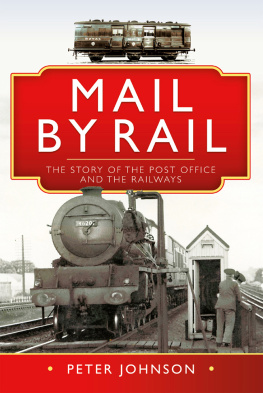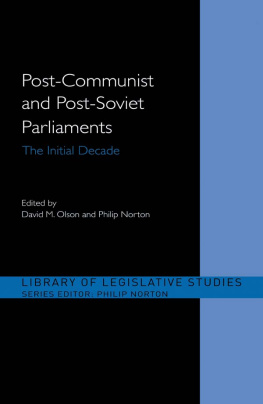2010 The University of North Carolina Press
All rights reserved
Manufactured in the United States of America
Designed by Jacquline Johnson
Set in Baskerville MT
by Keystone Typesetting, Inc.
The paper in this book meets the guidelines for
permanence and durability of the Committee on
Production Guidelines for Book Longevity of
the Council on Library Resources.
The University of North Carolina Press has been a member of the Green Press Initiative since 2003.
Library of Congress Cataloging-in-Publication Data
Rubio, Philip F.
Theres always work at the post office: African
American postal workers and the fight for jobs, justice,
and equality/Philip F. Rubio.
p. cm.
Includes bibliographical references and index.
ISBN 978-0-8078-3342-1 (cloth: alk. paper)
ISBN 978-0-8078-5986-5 (pbk.: alk. paper)
1. African American postal service employeesHistory.
2. African AmericansEmploymentHistory. 3. Postal
serviceEmployeesLabor unionsUnited States
History. I. Title.
HE6499.R82 2010
331.6396073dc22 2009049091
cloth 14 13 12 11 10 5 4 3 2 1
paper 14 13 12 11 10 5 4 3 2 1
PREFACE
From 1980 to 2000 I worked for the U.S. Postal Service (USPS). I enjoyed most of the experience, especially working as a letter carrier, meeting and serving the public every day. I began my career in Colorado as a PTF (part-time flexible) clerk at the Denver Bulk Mail Center (BMC), making eight dollars an hourmore than twice what the post office was paying starting workers a decade before. And when I left the post office I was a full-time letter carrier in Durham, North Carolina, earning about twenty dollars an hour. Other benefits included paid annual and sick leave, a choice of government-sponsored health plans, and a full retirement pension for those who served at least thirty years.
From the first day I was hired I was keenly aware of being a beneficiary of the Great Postal Wildcat Strike of 1970 that forms a key part of this narrative. The results of that brave action by thousands of postal workers across the country meant that my coworkers and I now had relatively secure jobs, could belong to a union with full collective bargaining rights, and could earn enough to buy a home and help pay to send our kids to college.
When I started work in February 1980 with other new hires in Denver, I first had to take a strength test (clerks and mail handlers had to heft an eighty-pound mail sack). I also had to sign agreements that I would not strike, did not belong to organizations that advocated the governments overthrow, was a high school graduate, and was not a convicted felon. From there each of us was on a ninety-day job probation en route to a potential USPS career as a regular full-time career appointment.
The Denver BMC was huge, resembling factories where I had worked. Mail handlers loaded and unloaded trucks. Clerks electronically and manually processed parcels as well as moved bundles of bulk mail from conveyor belts into big dusty gray sacks divided by zip code. It was all monotonous work. But talking and socializing made it go faster. And there was also a culture of resistance to mandatory overtime and other controversial management practices. One supervisor on the bulk mail belt seemed particularly intent on ordering me to work faster. I must have looked pretty discouraged, because an older black clerk waited until the supervisor left after yet another tirade to tell me with a grin: Theyll ride you your whole ninety days [probationary period], and then even after thatuntil you make regular. But once you make regular, they cant get you out of here with a crowbar!
He was right. Making regular meant full-time work guaranteed at forty hours a week (PTF status only guaranteed you twenty hours of work over a two-week period, although I rarely worked less than forty hours a week. There were also casuals appointed for ninety days at roughly half pay, and temporary employees known as TES appointed for one year.) And making regular allowed a postal employee to bid on an open position within ones craft, whether clerk, carrier, mail handler, maintenance, motor vehicle, or any other, depending on ones seniority or hire date. But making regular also afforded postal workers a certain amount of civil service due process job protection, which I also enjoyed from union membershipfirst with the American Postal Workers Union (APWU), and later the National Association of Letter Carriers (NALC) after I transferred to the letter carrier craft in the fall of 1980. Letter carriers work culture included trying to gain some control over their work environment, such as finding more efficient ways to deliver their routes other than the way they were arranged on the metal route cases. Every day saw a dance of disputes and negotiations with supervisors over how much mail to curtail (hold back) or deliver that day (first class mail was never curtailed)as carriers would often request overtime or help from those on the overtime desired list. On the other hand, there was also a sense that labor and management were on the same team, racing against time to sort and deliver peoples mail as soon as possible, in spite of often impractical official procedures.
In 1988 I moved with my family to North Carolina, where I first worked in the Raleigh post office before transferring to nearby Durham. The stations I worked in averaged around fifty employees. They featured constant talking and joking among workers to help relieve boredom and break the tension of getting the mail put up in a few hours before carriers had to go deliver their routes.
The post office has a highly unionized and well-educated workforce. Despite the history of anti-union laws and attitudes in the South where I now lived (North Carolina has the lowest unionization rate in the nation), I was impressed by the amount of union influence at the post office in Raleigh and Durham that resembled what I had experienced in the more union-friendly North and West, both at the post office and in manufacturing. I was glad to see workroom floor life governed by the same labor-management contract that also dictated our raises, benefits, and work rules. Our elected union shop stewards were there to file grievances if necessary, and in general represent workerswho also found their own ways to negotiate each workday with management, whether individually or collectively.
But it was in Durham, where I worked as a letter carrier from 1990 to 2000, that I noticed how many of my black coworkersabout 50 percent of the local workforcemade up a workplace community. It was a community that socialized inside and outside of work, welcomed new African American employees, and included many college graduates. Their jobs were also made possible in large part due to the pioneering efforts of the historically black National Alliance of Postal and Federal Employees (NAPFE).
When I left the post office in 2000 to pursue a Ph.D. in history at Duke University, I found that I could not entirely leave the post office behind. I wanted to learn more about the black labor and civic tradition that I had seen at the post office yet found absent in the historical literature. I wanted to write a history of black postal workers, their activism and influence on the post office and its unions, as well as the significance of government employment in the making of the black community. After almost a decade of research that included thirty-one oral history interviews and countless conversations with current and former postal workers, I have still only scratched the surface of this little-told but important story.










